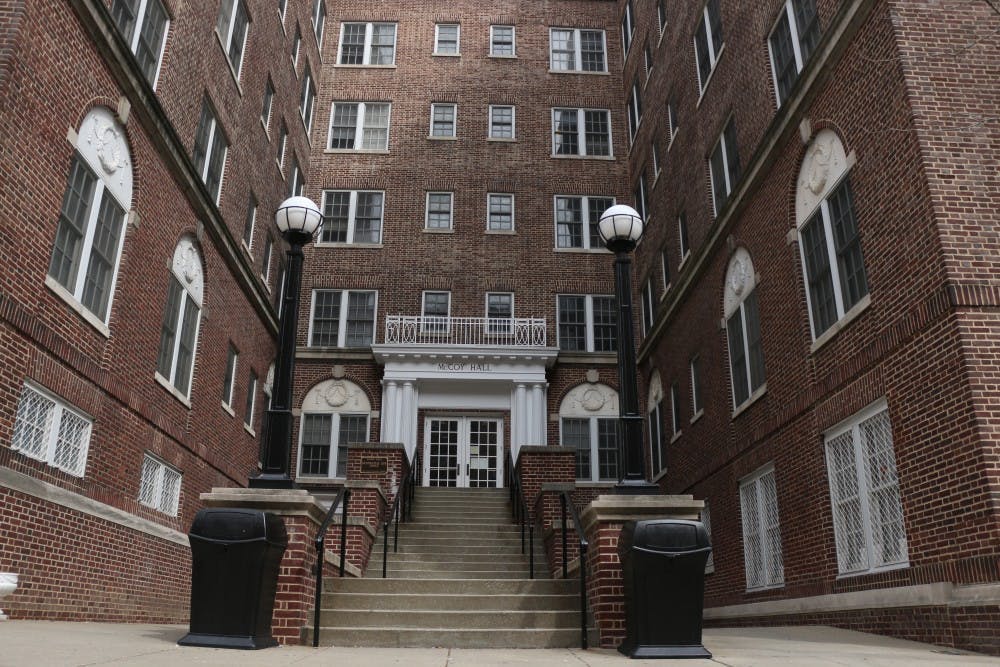Dorm living is a hallmark component of the college experience many look forward to, but students who moved on campus this fall are seeing its downsides. In interviews with The News-Letter, residents of on-campus housing expressed concerns about the detection of Legionella bacteria, sightings of rodents and bugs, water pipes bursting and cleanliness concerns.
McCoy Hall resident and sophomore Colette Youstra recounted her continuous issues with water leakages and her experience with maintenance in an interview with The News-Letter. She explained that the issues started on move-in day when she realized that her floor was flooded.
After she informed the Housing Facilities Office, housing maintenance temporarily installed three fans in the room to dry the carpet and prevent mold, but this prevented her and her roommates from moving in their furniture. In her interview, Youstra also reported ceiling leakage in her bathroom.
“We had a huge water bubble on the wall. [Maintenance] popped the bubble and then water just flooded everywhere,” she said. “Then they left it and said they’d come back in three days to paint over it instead of replacing it.”
She said the leakages kept occurring until the Housing Facilities Office eventually evacuated her and her roommates. Prior to this, maintenance placed buckets in the bathroom to catch the water.
“Our sewer was completely leaking and then the ground was getting flooded. We had buckets everywhere,” she said. “We were putting our towels on the floor to soak up all the water and maintenance was super slow in fixing the problem.”
When Housing Facilities decided that the buckets wouldn’t work, the residents were given an hour to pack their belongings and were moved to different housing units in McCoy.
Youstra also commented that the repairs were insufficient and the $50 in J-Cash she received as reimbursement weren’t accepted at the local businesses indicated on the University website.
Freshman Emma Dionne and her roommates, fellow residents of McCoy Hall, also experienced plumbing issues. They were moved out of their residence hall for a day while maintenance fixed the issue.
She received an email with instructions to move out by the next day. She suggested that earlier notice for temporary evacuations would be helpful as well as clearer communication about the issues in her residence hall.
“We just got this random email, and honestly none of us would have known about it otherwise,” Dionne said. “I couldn’t see the issue, so I don’t know how serious it was.”
Youstra echoed these sentiments, recalling that a more proactive response would have been more helpful. She also remarked that the University should make sure that the residence halls are ready for students to move into over the summer.
In an email to The News-Letter, Director of Media Relations Jill Rosen explained that continual building care and planning for the return to full occupancy this semester was a regular part of facility planning over the 2020-21 academic year.
“While we took every precaution to maintain the residential buildings to the high standard that we hold ourselves to, several unexpected issues arose after residents returned, including cracked pipes in McCoy,” she wrote. “Unfortunately, the cracked pipes only became evident after we returned to regular student usage.”
Hopkins students also reported hygiene concerns in on-campus housing. In an interview with The News-Letter, freshman Alisa Sivertsen, a resident of AMR I, detailed her and her friends’ experiences with bug infestations.
“One of my friends said she has spiders hanging from the ceiling, and she once woke up with a centipede next to her pillow. Another friend has spider traps everywhere and she says they’re full all the time,” she said. “They called Housing [Facilities] and they got exterminators, but they said they still had issues even after.”
In her email, Rosen stated that the number of pest complaints did not increase this semester.
“We have pest management on-site weekly and more often when issues arise, regularly inspecting potential access points for pests and providing remediation,” she wrote. “Any student who has a pest issue in their room should immediately contact the Housing Facilities Office to have it addressed swiftly and effectively.”
Sivertsen further reported that the girls’ bathrooms on her floor weren’t being cleaned.
“The toilet seats were disgusting. There was a puddle on the floor and there was hair in the puddle. It was like that for a week and [Housing Facilities staff] said they had a supervisor come by to see and that everything was fine,” she said. “Loads of people have been emailing and calling, so thankfully they’ve been cleaning it somewhat regularly now, which is good.”
Sophomore and Homewood Apartments resident Elaina Regier also raised complaints about the lack of accessible infrastructure in on-campus housing. In an email to The News-Letter, Regier emphasized the need for improved accessibility in residence halls. She pointed out that both elevators at Homewood Apartments sometimes stop working, and older buildings like the AMRs don’t have elevators at all.
In response, Rosen explained that the University’s long-term housing plan includes work to upgrade the AMRs to include elevators in order to support accessibility.
“It’s challenging to retrofit buildings that were not designed to be widely accessible, and it will take careful planning to make sure that the buildings remain open to students while undergoing these important accessibility upgrades,” she wrote. “Currently all residential students with approved disability accommodations are assigned housing spaces that support their needs.”
In an email to residents of on-campus housing, Director of Housing Sarah Mansfield encouraged residents to contact the Housing Facilities Office at (410) 516-7962 or requests@jhu.edu with any questions or concerns.





